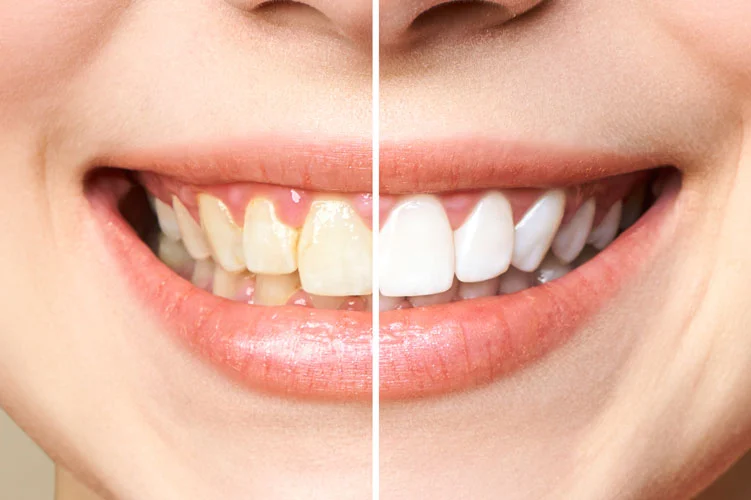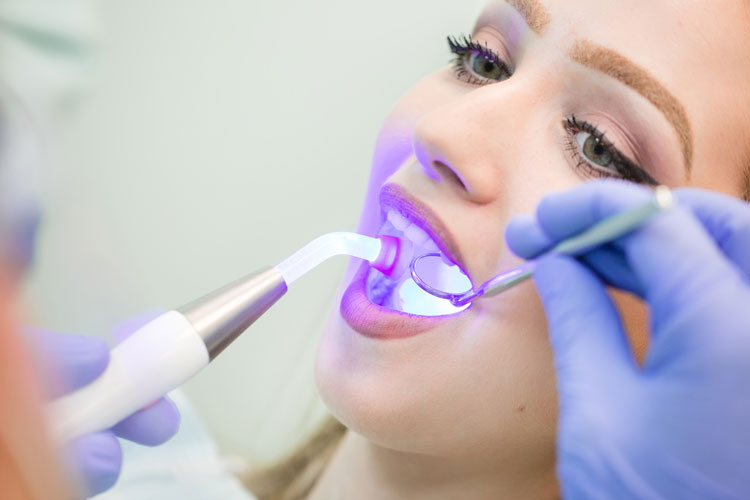Teeth Whitening: What Is the Best Way to Whiten Your Teeth?
While a bright and radiant smile can boost our self-confidence and leave a lasting impression, our teeth can become stained or discolored over time due to various factors such as aging, poor oral hygiene, or consumption of certain foods and beverages.
Fortunately, numerous teeth whitening options are available today that can help restore the natural whiteness of your teeth. Today’s blog will explore safe and effective teeth whitening options suitable for your entire family.
The Best Way to Whiten Your Teeth: Expert Advice
For every Scenario, Good oral care, including regular brushing, flossing your teeth, and dental checkups and teeth cleanings will go a long way towards helping remove the surface stains. If you want to see significant results, you’ll need to choose an option that really removes stains from the enamel on your teeth, such as in-chair treatments and whitening kits. Whitening toothpaste can also assist in helping you restore your smile and it is possible you can achieve desirable effects at-home by utilizing baking soda and hydrogen peroxide. As long as you do not have any oral health risks, you can establish a tooth whitening regime based on your individual needs and your budget.
What Can Professional Treatments Do?
Professional teeth whitening treatment is widely recognized as the most effective method for achieving a dazzling smile. Dentists offer in-office treatments that involve the application of a bleaching agent directly to your teeth.

Unlike at-home teeth whitening products, the professional procedure is carefully supervised to ensure safety and optimal results.
Professional whitening can significantly improve your teeth’ whiteness in just one session.
If you have grey or brown discoloration, oral health problems, dental restorations, or certain diseases you will need to discuss your teeth whitening options with a dentist.
For the most dramatic and instantaneous results, it’s best to visit your local dentist’s office or teeth whitening clinic for a professional whitening treatment, which offers a higher concentration of active bleaching ingredients.
The downside is that professional whitening can cost anywhere from $200 to $1,500 dollars per treatment. If that’s not quite in your budget, the good news is that over-the-counter teeth whitening products have come a long way, and the aesthetic results can now rival those treatments administered by your doctor, as long as you don’t have any underlying conditions.
What Home Treatments Can do and What Options do You Have?
If you prefer the convenience of whitening your teeth at home, several over-the-counter teeth whitening kits are available.
Compared to professional treatments, these kits typically contain whitening gel or whitening strips with a lower concentration of bleaching agents, such as carbamide peroxide or hydrogen peroxide.

While at-home tooth whitening may not deliver the same results as in-office treatments, they can still help lighten surface stains and improve the overall appearance of your smile as they whiten teeth.
If you have yellow teeth due to stains from food, drink, or aging then you should be able to use at home devices or products to help restore your smile.
There are three main options for teeth whitening at home: toothpaste, strips, light devices and natural remedies. Pastes offer minimal whitening results due to low levels of bleaching ingredients, which also means they have a low chance of permanently damaging your enamel.
Strips and light devices provide more dramatic results since the whitening ingredients make full contact with teeth for longer periods of time.
Whitening toothpaste pastes typically contain mild abrasives like hydrated silica, sodium bicarbonate, and calcium carbonate to polish and remove surface stains, essentially getting the “whitening” effect by scraping off the stains. Whitening toothpaste can also possibly contain low concentrations of active hydrogen peroxide to bleach teeth, which will strengthen the whitening effect.
Whitening strips use a plastic strip, tray, or mold to apply the bleaching ingredient hydrogen peroxide directly to teeth. Each session lasts between 30 minutes to two hours, and you’ll need up to three weeks of repeated use for full results. If you want to make your teeth white fast, strips are one of the most effective over-the-counter teeth whiteners, as the active ingredient is left on teeth for an extended period of time. It’s important to ensure you are using high-quality products so that you are not causing damage to the teeth.

Whitening light devices work by applying a whitening agent directly to the teeth, then a blue LED light is held over them to increase and accelerate results. Like teeth whitening strips, light devices are very effective because of the amount of time the active ingredient makes full contact with your teeth.
Natural Remedies work for those who prefer more natural approaches, there are several home remedies that may help whiten your teeth to some extent. Baking soda, for example, can be mixed with water to create a paste that acts as a mild abrasive. Brushing with this paste can help remove surface stains from the tooth enamel. However, it’s essential to use natural remedies cautiously and not rely solely on them for significant whitening results. We talk more about its cons in the next section.
It’s always advisable to consult your dentist before trying any home remedies.
The Best DIY Way to Whiten Your Teeth
Made popular by online resources, there are a ton of Do-It-Yourself options for whitening your teeth at home. There seem to be so many ways to whiten your teeth but do they all work? Are they all safe? Will some actually do more harm than good? When whitening your teeth at home, always keep a close eye on how you react and stop any treatment immediately if you notice sensitivity or pain. Generally, these are the safest way to effectively whiten your teeth at home:
- Creating a Baking Soda paste to use as a toothpaste.
- Oil Pulling to help whiten teeth and used as anti-bacterial for overall oral health.
- Swishing with diluted Hydrogen Peroxide, but only minimally limited use as not to damage your enamel.
- Apple Cider Vinegar is considered a natural cleaning product but should be used very sparingly and quickly as to not soften your teeth.
- Practicing good oral hygiene by brushing and flossing daily.
- Prevent stains from forming and limit your intake of staining food and drinks, such as red wine and coffee.
There is a surplus of other DIY “hacks” for whitening teeth, but can be more harm than good, due to the high level of acidity that is proven to permanently damage your enamel. With no real studies to show the effectiveness and safety, the following are not recommended and should be avoided:
- Apple Cider Vinegar or Hydrogen Peroxide for long periods of time.
- Fruit peels are not backed up by science to have any sort of whitening effect, although made famous by celebrities.
- Activated Charcoal toothpaste has been proved to be too abrasive for teeth, especially for daily use.
What’s the Best Option for Whitening Sensitive Teeth?
If you have sensitive teeth, you’ll want to take some extra precautions before using at-home whitening products. It is recommended to see your dentist if you have sensitive teeth, as it may be a sign of dental problems. If your teeth are okay but you simply have sensitivity, your dentist can help with desensitizing treatments. Just ensure you are paying close attention to how your teeth react. If you experience sensitivity or if the edges of your teeth start to appear see-through, you should stop the whitening regimen immediately, so that permanent damage is not inflicted.
Some FAQs Related to Teeth Whitening
Will whitening my teeth change the color of a fake tooth?
If you have a fake tooth, at-home teeth whiteners will not damage it, and they will have no impact on its brightness or color. Generally, once that fake tooth is in place the color remains fairly stable and cannot be altered.
Can yellow teeth become white again?
Yes, yellow teeth can become white again through teeth whitening methods, such as professional treatments or over-the-counter products, which can effectively remove stains and discoloration, restoring the teeth to a brighter shade.
Why are my teeth still yellow if I brush them every day?
Some of the most common causes of tooth discoloration include drinking beverages such as coffee, soda, and wine. These substances get into the enamel of your teeth and can cause long-term discoloration. Excessive exposure to fluoride can cause the teeth to yellow, especially in children.
What is the cheapest way to whiten your teeth?
Creating a paste from 1 part baking soda and 1 part water is considered the most cost-effective way to whiten teeth at home.
Consult with Dr. Dalesandro & Associates
Dr. Dalesandro & Associates are exceptionally qualified Tucson dentists to care for all your general, emergency, and preventative dentistry needs.
In addition, our staff of Dental Hygienists and Dental Assistants are warm and professional. Plus, we serve multiple family members, from young children to adults. Whatever your needs, from preventative care to restorative such as cavity fillings to emergency first aid services for accidents, we do it all.
